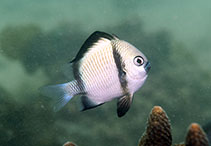| Family: |
Pomacentridae (Damselfishes), subfamily: Chrominae |
| Max. size: |
9 cm TL (male/unsexed) |
| Environment: |
reef-associated; marine; depth range 1 - 50 m, non-migratory |
| Distribution: |
Eastern Central Indian Ocean to Western Pacific: : Cocos-Keeling Islands in the eastern Indian Ocean to Samoa and the Line Islands, north to southern Japan, south to Rowley Shoals (eastern Indian Ocean) and Lord Howe Island (Ref. 37816). Not found in the Hawaiian and Society islands and islands beyond. Replaced by Dascyllus carneus in the Indian Ocean (Ref. 37816). |
| Diagnosis: |
Dorsal spines (total): 12-12; Dorsal soft rays (total): 14-16; Anal spines: 2-2; Anal soft rays: 12-14. Color variable according to ecological and behavioral conditions: basically body whitish with snout, interorbital and forehead greenish; black bar on anterior and a fainter one on posterior part of the body; blackish scale margins; pelvic fins mostly black; pectorals transparent with a spot on its base. Margins of preorbital, suborbital, and preoperculum finely serrated (Ref. 2746). Body depth 1.4-1.6 in SL (Ref. 90102). |
| Biology: |
Adults occur in outer lagoon and seaward reefs. They inhabit branching coral heads, particularly Pocillopora eydouxi. Form schools, often in silty habitats (Ref. 48636). Male prepares a nest by cleaning with its mouth a rock or coral surface where the female will attach the eggs (Ref. 5503). Oviparous, distinct pairing during breeding (Ref. 205). Diurnal species (Ref. 54980; 113699). |
| IUCN Red List Status: |
Least Concern (LC); Date assessed: 23 September 2021 Ref. (130435)
|
| Threat to humans: |
harmless |
Source and more info: www.fishbase.org. For personal, classroom, and other internal use only. Not for publication.
